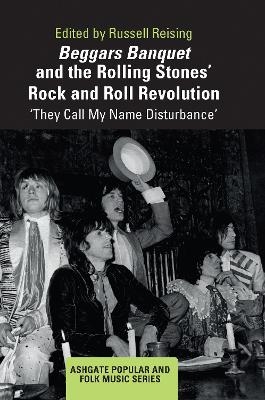
Beggars Banquet and the Rolling Stones' Rock and Roll Revolution
Routledge (Verlag)
978-1-032-08243-1 (ISBN)
Russell Reising is Professor of American Culture and Asian Studies, University of Toledo, Ohio
Russell Reising: Introducton: "Just trying to do this jigsaw puzzle"
Part I: What can poor boys do, except to sing (and play and produce) in a rock ‘n' roll band?
John Covach: Jimmy Miller, the Rolling Stones, and Beggars Banquet
Steven Baur: 'And the drummer, he’s so shattered': the percussive core of Beggars Banquet
Akitsugu Kawamoto: 'And the bass player, he looks nervous': progressive elements in the bass lines of Beggars Banquet
Jim LeBlanc: 'Too much is never enough': Beggars Banquet and the decline of Brian Jones
Stephen D. Christman: "Five strings, three notes, two fingers, one asshole": Keith Richards’s use of open G tuning
James McGrath: Doctor, I’m damaged: medical and cultural mythologies of Nicky Hopkins and the Rolling Stones
Part II: "What’s puzzling you is the nature of my game": some ideas
Ruth Tallman: Condemned to be free: the frightening uncertainty of a world without morality
Norma Coates: How can a smart chick like me listen to the Stones and not throw up? A speculative exploration of Beggars Banquet and misogyny
Brian Goodman, Woo Woooo: Beggars Banquet’s new aesthetic
Part III: Some songs
Kimberly Mack: Please allow me to introduce myself’: autobiographical blues self-fashioning in ‘Sympathy for the Devil’
Peter Mills: "Ghost at the banquet : the enigma of 'Child Of The Moon'"
Jacopo Conti: The 'old' and 'new' Rolling Stones in aural staging and chord changes of 'Street Fighting Man'
Part IV: The Rolling Stones, live if you want it
Steve Waksman: On the Road to Altamont: the Rolling Stones on Tour, 1969
Kimi Karki: 'I've been around for a long, long year’: the spectacular evil in the Rolling Stones’ live performance career
| Erscheinungsdatum | 03.08.2021 |
|---|---|
| Reihe/Serie | Ashgate Popular and Folk Music Series |
| Zusatzinfo | 10 Illustrations, black and white |
| Verlagsort | London |
| Sprache | englisch |
| Maße | 156 x 234 mm |
| Gewicht | 453 g |
| Themenwelt | Kunst / Musik / Theater ► Musik ► Musiktheorie / Musiklehre |
| Kunst / Musik / Theater ► Musik ► Pop / Rock | |
| Sozialwissenschaften | |
| ISBN-10 | 1-032-08243-7 / 1032082437 |
| ISBN-13 | 978-1-032-08243-1 / 9781032082431 |
| Zustand | Neuware |
| Informationen gemäß Produktsicherheitsverordnung (GPSR) | |
| Haben Sie eine Frage zum Produkt? |
aus dem Bereich


